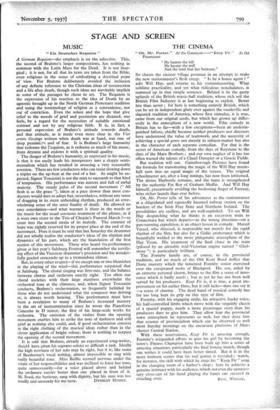STAGE AND SCREEN
MUSIC " Ein Deutsches Requiem "
A German Requiem—the emphasis is on the adjective. This, the second of Brahms's larger compositions, has nothing in
common with the Latin Mass for the Dead. It is not litur- gical ; it is not, for all that its texts are taken from the Bible, even religious in the sense of embodying a doctrinal point of view. For Brahms deliberately avoided the inclusion of•any definite reference to the Christian ideas of resurrection and a life after death, though such ideas are inevitably implicit in some of the passages he chose to set. The Requiem is the expression of his reaction to the idea of Death by an agnostic brought up in the North German Protestant tradition and acing the terminology of religion as a convenience, not out of conviction. Even the solace and the hope that give relief to the moods of grief and pessimism are dictated, one feels, by a regard for the necessities of suitable emotional contrast and not by any religious faith. It is, in fact, a personal expression of Brahms's attitude towards death, and that attitude, as is made even more clear in the Vier ernste Gesainge written when death was at hand, was one of deep pessimix-a, and of fear. It is Brahms's large humanity that redeems the Ilequiem, as it redeems so much of his music, from dryness and endows it with a spiritual quality.
The danger of Brahms's humanity, as expressed in his music, is that it too easily leads his interpreters into a sloppy senti- mentalism which has resulted in arousing a very reasonable aversion. There are few conductors who can resist slowing down a triplet on the up-beat at the end of a bar. As might be ex- pected, Signor Toscanini is not the man to succumb to that kind of temptation. His performance was austere and full of awful majesty. The steady pulse of the second movement (" All flesh is as the grass "), taken at a pace slower than most con-
ductors would dare to adopt but, nevertheless, without any sense of dragging in its stern unbending rhythm, produced an over-
whelming sense of the utter finality of death. He allowed no easy consolation—and what warrant is there in the words or the music for the usual sensuous treatment of the phrase, as if it were own sister to the Trio of Chopin's Funeral March ?—to enter into the second strain of its melody. The contrast of hope was rightly reserved for its proper place at the end of the movement. Here it must be said that last Saturday the drummer did not wholly realise the conductor's ideas of the rhythm and dynamics of his part, which are the foundation of the first section of this movement. Those who heard the performance given at last year's Salzburg Festival will remember the terrify- ing effect of the Viennese drummer's precision and his wonder- fully graded crescendo up to a tremendous climax.
But, in every other respect—if we except one or two blemishes in the playing of the wind—this performance surpassed that at Salzburg. The choral singing was first-rate, and the balance between chorus and orchestra exactly right. Too often our choral societies with their large numbers overwhelm the orchestral tone at the climaxes, and, when Signor Toscanini conducts, Brahms's orchestration, so frequently belittled by those who do not understand what the composer was driving at, is always worth hearing. This performance must have
been a revelation to many of Brahms's increased mastery in the art of instrumentation since he wrote the Pianoforte Concerto in D minor, the first' of his large-scale works for
orchestra. The omission of the violins from the opening movement enables him to strike the note of darkness and still grief as nothing else could, and, if good orchestration consists in the right clothing of the musical ideas railer than in the clever application of bright colour, there is nothing to surpass the opening of the second movement.
It is odd that Brahms, already an experienced song-writer, should have given his soprano soloist so difficult a task. Ideally the high tessirura of her solo may be right, but it is, like some Of Beethoven's vocal writing, almost impossible to sing with really beautiful tone. Miss Baillie seemed nervous under the strain of her responsibilities and was inclined to force her tone, quite unnecessarily—for a voice placed above and behind the orchestra carries better than one placed in front of it. M. Sved, the baritone, sang With dignity, but his tone was too














































 Previous page
Previous page